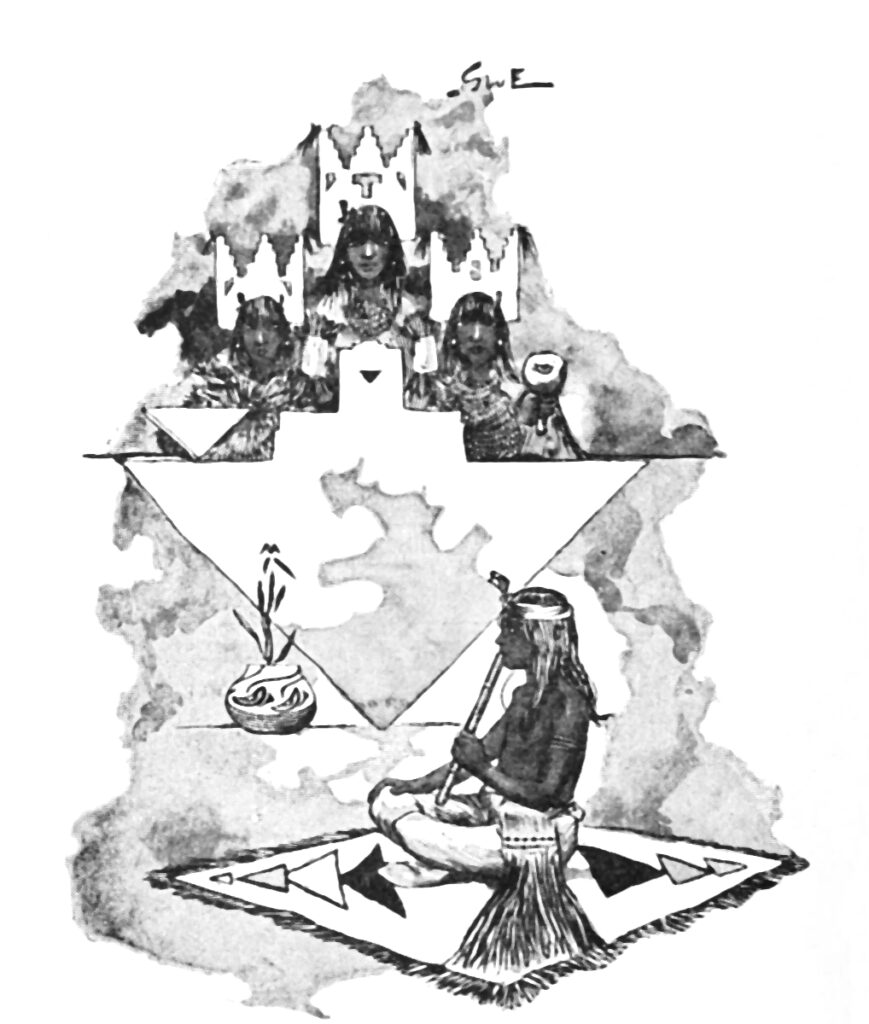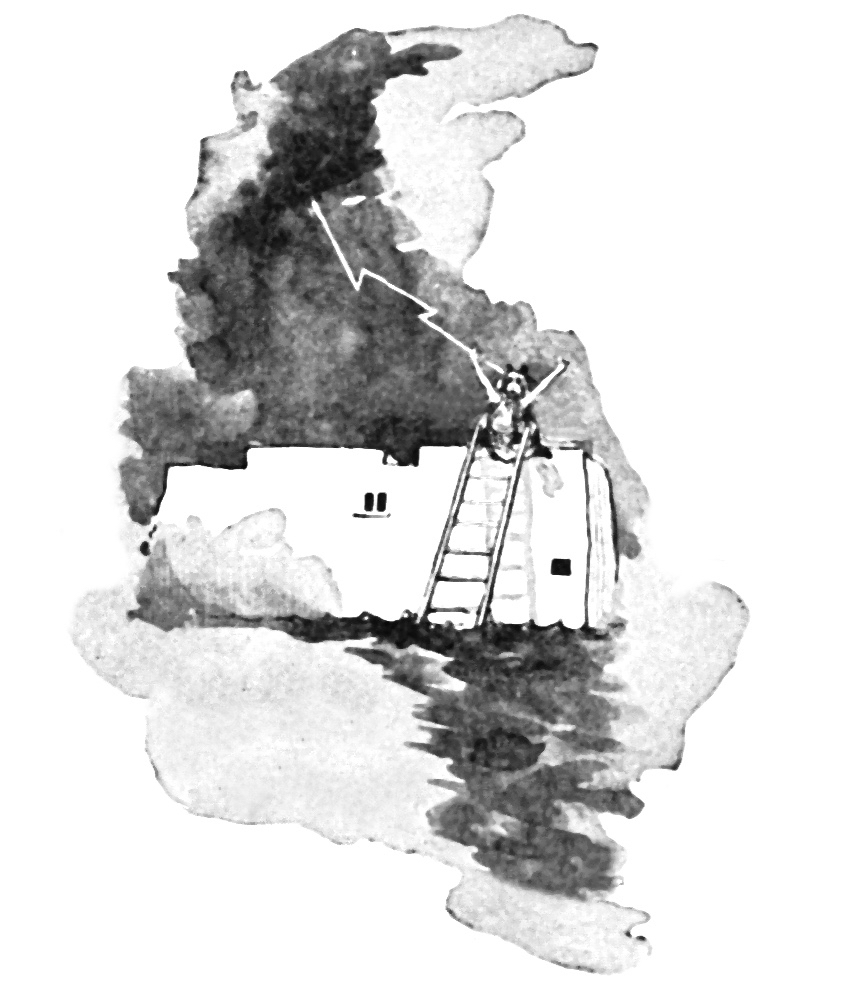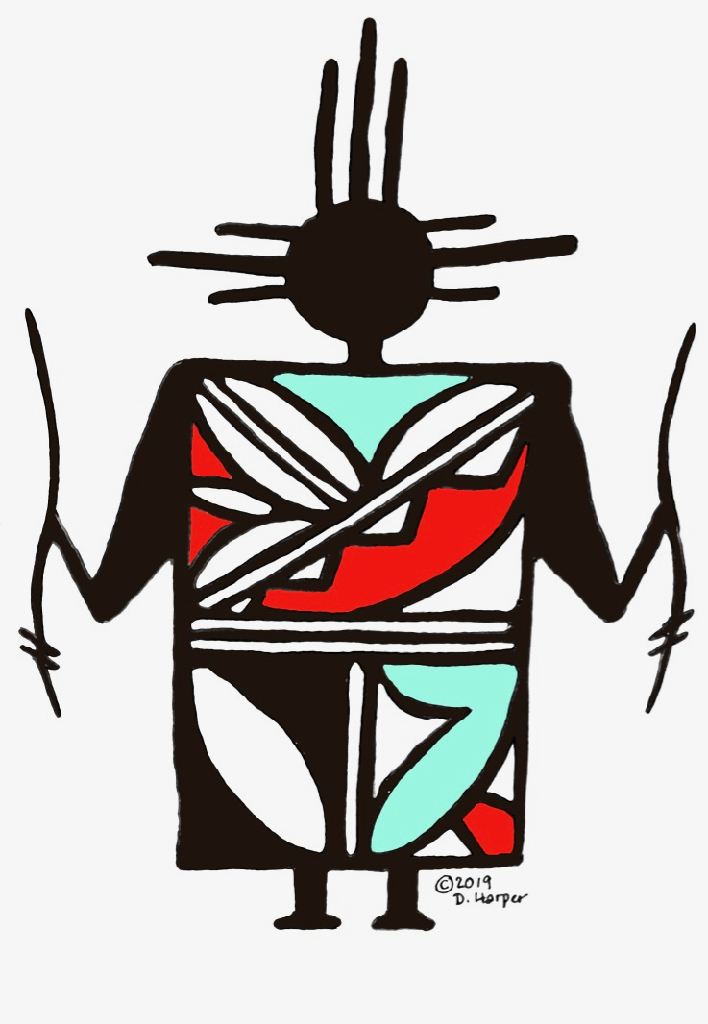Another in a series of stories for liberal religious kids. This story comes from Charles Fletcher Lummis, Pueblo Indian Folk-Stories (New York: D. Appleton-Century Co., 1910), pp. 109-116; a book of stories of the Ysleta Del Sur Pueblo, or Tigua Indians of Texas. I have edited the story for length and clarity.
Long ago there was still a village east of the Eagle-Feather Mountains, where there lived a Hunter. One day, while out hunting, he followed the trail of an antelope until the trail ended in a large lake.
Just then, a fish thrust its head from the water and said, “Friend Hunter, you are on dangerous ground!” and off it went swimming.
Before the Hunter could recover from his surprise, a Lake-Man came up out of the water and said, “How is it that you are here, where no human ever came?”
The Hunter told his story, and the Lake-Man invited him to come in to his house. They entered the house by a trap-door in the roof, and climbed down a ladder. Inside, there were doors to the east, north, west, and south, as well as the door in the roof. Soon the Lake-Man learned that the Hunter had a wife and son at home.
“Why not come live with me?” the Lake-Man said. “I am no hunter, but I have plenty of other food. We could live very well here together.” And he showed the Hunter the four other huge rooms, all filled with corn and dried squash and the like.
“I will come with my wife and son in four days,” said the Hunter, “if the leader of my village will let me.”
So the Hunter went home, and his wife thought very well of the offer. The leader of his village did not want him to go, for he was the best hunter in all the pueblo, but at last gave permission.
So the Hunter and his wife and little boy came to the lake with all their property. The Lake-Man welcomed them, and they settled in. The Hunter went out hunting and brought back great quantities of game, and his wife took charge of the household, as was their custom.
Some time passed very pleasantly. But at last the Lake-Man, who had an evil heart, pushed the Hunter into the East Room, locked the door and left him there to starve. The room was full of the bones of people whom he had tricked in the same way.
The boy was now old enough to hunt small game, and he brought home many rabbits. But the evil-hearted Lake-Man wanted to get him out of the way, too. One morning when the boy was about to start hunting, he heard his mother groaning as if about to die.
“Your mother is in terrible pain,” said the evil Lake-Man, “and the only thing that will cure her is sacred ice from the Lake of the Sun in the east.”
The boy said he would go get the ice, and started off toward the sunrise.
He walked over the brown plains until at last he came to the house of Old-Woman-Mole. She was there all alone, for her husband had gone to hunt. They lived in an old broken-down hut, and she was huddled trying to keep warm by a dying fire. But when the boy knocked, she rose and welcomed him kindly and gave him all there was in the house to eat: a tiny bowl of soup with a patched-up snowbird in it. The boy was very hungry, and picking up the snowbird bit a big piece out of it.
“Oh, my child!” cried the old woman. “You have ruined me! My husband trapped that bird these many years ago, but could never get another, and that is all we have had to eat ever since. So we never bit it, but cooked it over and over and drank the broth. And now not even that is left.” And she wept bitterly.
“Nay, Grandmother, do not worry,” said the boy, for he saw many snowbirds alighting nearby. Using his long hair, he made sanres and soon caught many snowbirds. Then the Old-Woman-Mole was full of joy. After the boy told her his errand, she said:
“I shall help you. When you come into the house of the True People, they will offer you a seat, but you must not take it. They will try you with smoking the weer, but I will help you.”
With that, the boy started away to the east. At last, he came so near to Sun Lake that medicine men and guards of the True People saw him coming, and went in to tell the True People.
“Let him be brought in,” said the True People; and the guards brought the boy in through a magnificent building, until he stood in the presence of the True People in a vast room: white-colored gods of the East, blue gods of the North, yellow gods of the West, red gods of the South, and rainbow-colored gods of Up, Down, and Center. Beyond them were the sacred animals: the buffalo, the bear, the eagle, the badger, the mountain lion, the rattlesnake, and all the others that are powerful in medicine.
The True People offered the boy a white robe to sit on; but he declined respectfully, saying that he had been taught, when in the presence of his elders, to sit on nothing save what he brought, and he sat upon his blanket and moccasins. Then he told them that he had come for the sacred ice, to save his mother’s life.
The True People gave him a sacred weer, that is, a hollow reed filled with the magical plant pee-en-hleh, from the smoke of which the rain clouds come. The boy took in the unpleasant smoke, but the Old-Woman-Mole dug a hole up to his toes, and the smoke went down through his feet into the hole so that no smoke escaped into the room of the True People.

“Surely he is our child,” said the True People to one another, “but we must test him again.” So they put him into the room of the East with the bear and the mountain lion, but he came out again unhurt. They put him into the room of the North, with the eagle and the hawk; into the room of the West, with the snakes; into the room of the South, with the Apaches and other human enemies of his people. He came forth from each room unhurt.
“Surely he is our child,” said the True People to one another, “but we must test him again.” They had a great pile of logs built up, set the boy on the top of the pile and lighted it. But in the morning, the boy sat there unharmed, saying, “I am cold and would like more fire.”
So the guards brought him inside, and the True People said: “You have proved yourself worthy of us, and now you shall have what you seek.”
They gave him the sacred ice, and he hurried home, stopping only to thank the Old-Woman-Mole.
When the evil Lake-Man saw the boy, he was very angry, for he had never expected him to return with the sacred ice. He pretended he was glad to see the boy, but said he must go to the gods of the South to get sacred ice there.
The boy walked south across the brown plains until he came to a drying lake. There, dying in the mud, was a little fish. Picking it up, the boy put it in his gourd canteen of water. After awhile he came to a good lake, and the fish in his gourd said, “Friend Boy, let me swim while you eat your lunch, for I love the water.”
So he put the fish in the lake; and when he was ready to go on, the fish came to him, and he put it back in his gourd. At three lakes he let the fish swim while he ate; and each time the fish came back to him.
Beyond the third lake began a great forest which stretched clear across the world, and was so dense with thorns and brush that no human being could pass through. The tiny fish changed itself into a great Fish-Animal with hard, strong skin, and bidding the boy mount upon its back, it went plowing through the forest, breaking down big trees like stubble, and bringing him through to the other side without a scratch.
“Now, Friend Boy,” said the Fish-Animal, “you saved my life, and I will help you. When you come to the house of the True People of the South, they will try you as they did in the East. When you have proved yourself, the leader of the True People will bring you his three daughters, from whom to choose you a wife. The two eldest are very beautiful, and the youngest is not; but choose the youngest, for she is good and the beauty of the older sisters does not reach to their hearts.”
The boy thanked the fish and went on. At last he came to the house of the True People of the South. They tried him just as the True People of the East had done. Once again he passed the tests, and they gave him the sacred ice. Then the leader of the True People brought his three daughters, and said, “You are now old enough to have a wife, and I see that you are someone who cares for those around him. Therefore, choose one of my daughters to marry.”
The boy remembered the words of his fish friend, and said, “I choose your youngest daughter.”
The leader of the True People was pleased, and the boy and the youngest daughter were married. They started home, carrying the sacred ice and many presents. With the help of the Fish-Animal, they got through the forest, and walked on.

At last they came in sight of the big lake, and over it were great clouds, with the forked lightning leaping forth. They could see the evil Lake-Man sitting at the top of his ladder, watching to see if the boy would return, and as they watched the lightning of the True People struck him dead.
So the boy and the youngest daughter found the boy’s mother, and the three of them left the house of the evil Lake-Man. They left all the belongings of the evil Lake-Man behind, and when they got to the shore of the lake, the boy stood and prayed to the True People that the lake might be accurst forever. From that day its waters turned salt, and no living thing has drunk therefrom.

